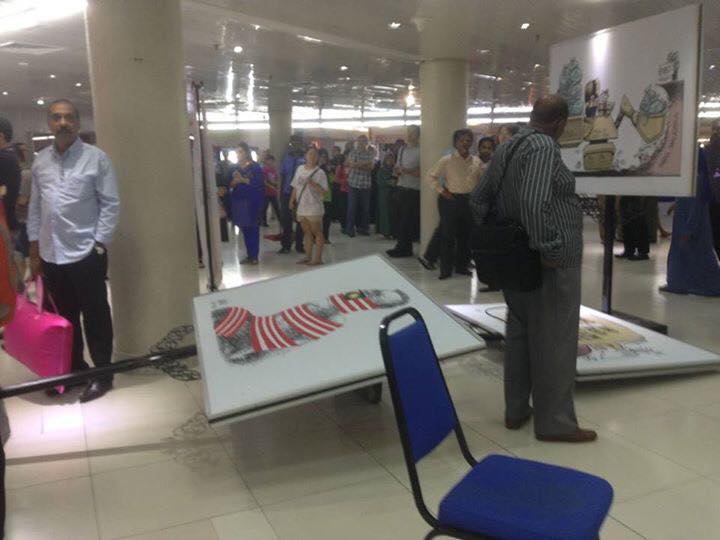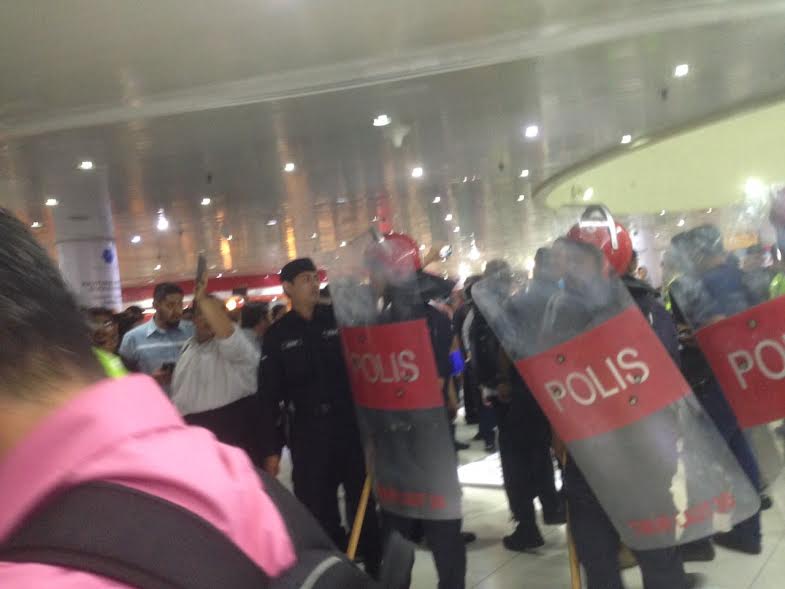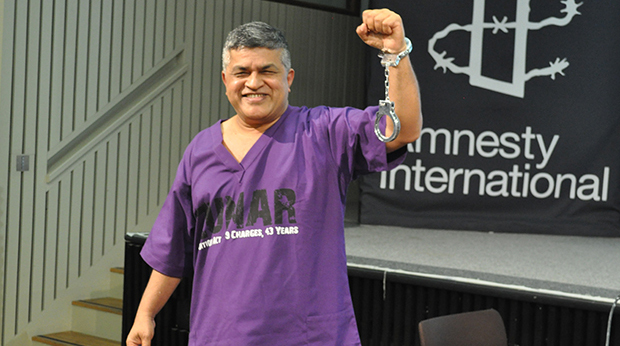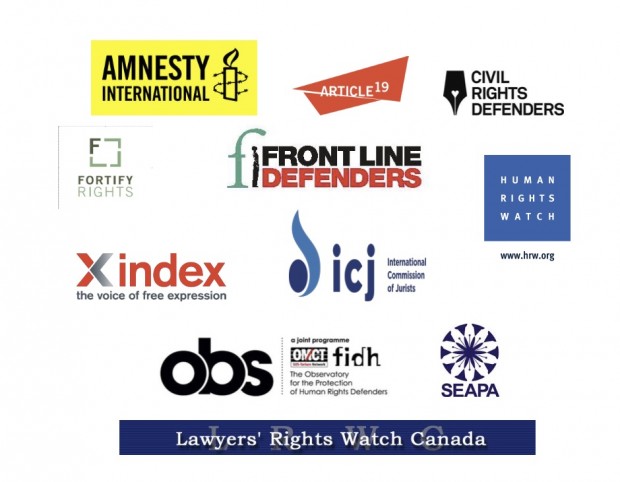Index relies entirely on the support of donors and readers to do its work.
Help us keep amplifying censored voices today.
[vc_row][vc_column][vc_column_text]
Update: Since this article was published, Zunar has been arrested on charges of sedition.
Zulkiflee Anwar Haque, aka Zunar, a Malaysian political cartoonist, continues to face harassment from the government and its supporters due to his work.
His cartoons and books have previously been banned and confiscated for being allegedly “detrimental to public order”, he is to stand trial on nine charges of sedition in January, which carries a 34-year sentence if he is convicted, and he is currently banned from leaving the country.
Earlier today a mob of 30 people – who he called “pro-government thugs” – surrounded him at the opening of his new exhibition of satirical cartoons, threatened him and damaged some of his artwork.


“They were very hostile for the first 20 minutes because I was alone with friends,” Zunar told Index. “They pulled my shirt and threw a punch at me, but people came and rescued me.”
As the situation became more unmanageable, police were called in, followed by riot police, to contain the mob. No arrests were made.

“I was very scared but I stayed calm – I didn’t react,” Zunar added.
The exhibition had only been open for a few hours before being forced to close. Zunar has taken the decision to close the exhibition permanently due to safety concerns and told Index he will seek more secure locations for future exhibitions.
Such attacks are becoming more common in Malaysia, as being in opposition to the government becomes ever-more difficult. Last week a similar crowd interrupted a speech by the opposition MP on Khalid Samad on the grounds of the county’s Parliament.
Last Friday, on the eve of a massive Bersih protest in the Malaysian capital of Kuala Lumpur, the activist Maria Chin Abdullah was arrested, prompting many thousands of people to take to the streets in yellow t-shirts to demand her release.
Protesters are also calling for free and fair elections and for the Malaysian Prime Minister, Najib Razak to resign.
“The Malaysian government is now a minority government, with the ruling party only receiving about 47% of the popular vote,” Zunar explained. “So the Malaysian government will now do anything they can to ensure they remain in power, including fostering and supporting this kind of chaos and attack pro-democracy activists.”
Talking about his upcoming trial – which was due to take place back in November 2015 – Zunar said: “I don’t put any hope in the system. I would like to highlight again that this is politically motivated. It’s not about the strength of the evidence against me, it’s not about how good the witnesses are, in Malysia it depends on the judges. And if we are lucky enough we will find one or two independent judges – that is the best we can hope for.”
Zunar is more than willing to stand trial, however, to highlight the abuses of freedom and democracy in Malaysia for all the world to see.
In the meantime, as ever, he will continue to draw.
 [/vc_column_text][vc_basic_grid post_type=”post” max_items=”4″ element_width=”6″ grid_id=”vc_gid:1480182362387-e768b001-afd7-3″ taxonomies=”4218″][/vc_column][/vc_row]
[/vc_column_text][vc_basic_grid post_type=”post” max_items=”4″ element_width=”6″ grid_id=”vc_gid:1480182362387-e768b001-afd7-3″ taxonomies=”4218″][/vc_column][/vc_row]

Award-winning Malaysian cartoonist Zunar, who faces up to 43 years imprisonment for tweeting his cartoons criticising his country’s leaders reported on 17 October that he has had a travel ban imposed blocking him from travelling outside the country.
Zulkiflee Anwar Ulhaque, known as Zunar, has faced harassment from the Malaysian government for his political cartoons. Five of his books have been banned in Malaysia and his office has been raided several times, resulting in the confiscation of thousands of his books.
The Malaysian government has banned his books on the grounds that they can “influence the public to revolt against the leaders and government policies” and they are “detrimental to public order.”
Any bookstore, vendor, printer or publisher who agrees to sell the cartoonist’s books also face harassment from the Malaysian government, receiving threats of having their business licenses revoked or their offices raided. Zunar’s books are now printed without the name of the publisher to protect them. Although this is against the law, he has no choice if he wishes to continue publication of his cartoons.
Zunar is being charged under the Sedition Act, which was originally put in place in 1948 to curb opposition to British colonial rule, but the law has remained part of Malaysia’s legal system. The Sedition Act prohibits any behavior that could be deemed detrimental to the government. This outdated law allows the Malaysian government to censor opposition.
His cartoons have covered a wide range of controversial topics in Malaysia, from unsolved murders to political conspiracies. His motto is proudly displayed throughout his website, “How Can I Be Neutral, Even My Pen Has a Stand” emphasising his unfaltering mindset to stand up to the Malaysian government.
Zunar has challenged the Sedition Act and the Malaysian government multiple times in the past. First in 2010 to fight the banning of his books in the country, then in 2011 against the government and police for unlawful arrest and detention. Unfortunately in both cases the courts ruled against him.
Now with a travel ban placed on him by the Malaysian government, Zunar plans to again file a suit to challenge its validity. The cartoonist discovered the ban on 17 October 2016 at the Kuala Lumpur International Airport, though it has been effective since 24 June 2016.
With the court proceedings for Zunar set for 22 November, he faces a maximum of 43 years in prison for tweeting his cartoons. The cartoonist has been imprisoned twice in the past; once for two days in 2010 and again for three days in 2015, both times for violating the Sedition Act. Three of Zunar’s assistants were also arrested in 2014 for selling his cartoons.
Zunar is currently out on bail but is stuck in Malaysia with the threat of 43 years imprisonment ahead of him. Despite this, he remains dedicated to exposing the corruption of the government, stating in an interview with Index on Censorship in 2015, “I will never stop, it is my right as a citizen to express my view and my responsibility as a cartoonist to give alternative views.”

Dear Attorney General Mohamed Apandi Ali,
We write to you as organisations that are deeply concerned by the decision of the Malaysian authorities to prosecute Lena Hendry for her involvement in the screening of the award-winning human rights documentary, “No Fire Zone: The Killing Fields of Sri Lanka,” in Kuala Lumpur on July 9, 2013. The charges against her violate Malaysia’s obligations to respect the rights to freedom of opinion and expression, notably to receive and impart information. We respectfully urge you to drop the charges against Hendry. Her trial in Magistrate Court 6 in Kuala Lumpur is slated to begin on December 14, 2015.
As you know, Hendry is being charged under section 6 of the Film Censorship Act 2002, which imposes a mandatory prior censorship or licensing scheme on all films before they can be screened at any event, except films sponsored by the federal government or any state government. If convicted, she faces up to three years in prison and a fine up to RM 30,000.
The prosecution appears intended to restrict the activities of Hendry and members of the KOMAS, the human rights education and promotion organisation with which she works, by hindering their efforts to provide information and share their perspectives on human rights issues.
International human rights law and standards, such as found in article 19 of the Universal Declaration of Human Rights, states that “everyone has the right to freedom of opinion and expression; this right includes freedom to hold opinions without interference and to seek, receive, and impart information and ideas through any media and regardless of frontiers.”
Malaysia has committed to ensuring that all human rights defenders are able to carry out their activities without any hindrance or fear of reprisals from the government. In November, Malaysia voted in favor of a resolution on “Recognizing the role of human rights defenders and the need for their protection” in the 3rd Committee of the United Nations General Assembly. The resolution set out the urgent need for governments to protect human rights defenders worldwide. Article 1 of the UN Declaration on Human Rights Defenders, adopted unanimously by the UN General Assembly on December 9, 1998, states that “everyone has the right, individually and in association with others, to promote and to strive for the protection and realization of human rights and fundamental freedoms at the national and international levels.” Article 12(2) provides that the government shall “take all necessary measures to ensure the protection by the competent authorities of everyone, individually and in association with others, against any violence, threats, retaliation, de facto or de jure adverse discrimination, pressure or any other arbitrary action as a consequence of his or her legitimate exercise of his or her rights.”
In addition to dropping the charges against Hendry, we also urge you, as attorney general, to seek to repeal provisions of the Film Censorship Act 2002 that allow unnecessary and arbitrary government interference in the showing of films in Malaysia. This policy denies Malaysians the opportunity to benefit from a range of viewpoints on issues of importance to Malaysian society and that affect Malaysia’s role in the world.
Sincerely,
Brad Adams
Director, Asia Division
Human Rights Watch
Gail Davidson
Executive Director
Lawyers’ Rights Watch Canada
Jodie Ginsberg
Chief Executive
Index on Censorship
Karim Lahidji
President
International Federation for Human Rights (FIDH)
Mary Lawlor
Director
Front Line Defenders
Edgardo Legaspi
Executive Director
Southeast Asian Press Alliance (SEAPA)
Marie Manson
Program Director for Human Rights Defenders at Risk
Civil Rights Defenders
Champa Patel
Interim Director, South East Asia and Pacific Regional Office
Amnesty International
Amy Smith
Executive Director
Fortify Rights
Oliver Spencer
Head of Asia
Article 19
Gerald Staberock
Secretary General
World Organization Against Torture (OMCT)
Sam Zarifi
Regional Director for Asia and the Pacific
International Commission of Jurists
Cc:
Ahmad Zahid Hamidi, Minister of Home Affairs
Joseph Y. Yun, Ambassador of the United States of America to Malaysia
Luc Vandebon, Ambassador of the European Union to Malaysia
Victoria Treadell, British High Commissioner to Malaysia
Christophe Penot, Ambassador of France to Malaysia
Holger Michael, Ambassador of Germany to Malaysia
Rod Smith, Australian High Commissioner to Malaysia
Judith St. George Canadian High Commissioner to Malaysia
Dr John Subritzky, New Zealand High Commissioner to Malaysia
Ibrahim Sahib, Sri Lanka High Commissioner to Malaysia

The court case against Malaysian cartoonist Zunar on nine charges of sedition was due to begin today, carrying a maximum penalty of 43 years in prison. Instead, the artist and his lawyers filed applications to have their cases referred to the high court, mounting a constitutional challenge to the country’s Sedition Act and delaying the case against them.
The charges of sedition are in relation to a series of nine tweets the cartoonist wrote in February concerning the politically charged sodomy conviction against Malaysian opposition leader Datuk Seri Anwar Ibrahim.
Zunar’s lawyer, Eric Paulsen, who was also due to face charges of sedition this morning, says the Sessions Court, which was due to hear the case, does not have jurisdiction to do so. He has posed the following three points for consideration by the court:
1 Whether section 3(3) of the Sedition Act 1948 is unconstitutional as it states that the “intention” of the maker “shall be deemed to be irrelevant” when making the seditious statement;
2 Whether the Sedition Act unlawfully criminalises peaceful expression of free speech and is thus unconstitutional;
3 The recent Federal Court case in PP v Azmi Sharom misread the constitution and should be reconsidered. Under Article 10(2), “Parliament may by law impose” restrictions on fundamental rights. Therefore, as the Sedition Act pre-dates the Constitution, it cannot be read into Article 10(2) to restrict freedom of speech.
The Malaysian Federal Court dismissed a similar constitutional challenge against the Sedition Act by University of Malaya law lecturer Dr Azmi Sharom early last month. Zunar’s application is now fixed for a hearing on 8 December, and the decision will be made on 15 December.
In the meantime, there are no trial dates set for the sedition case against Zunar and his lawyers.
Zunar has just returned to Malaysia, after visiting the UK to raise awareness of his case and mount an exhibition of his work at London’s Cartoon Museum.